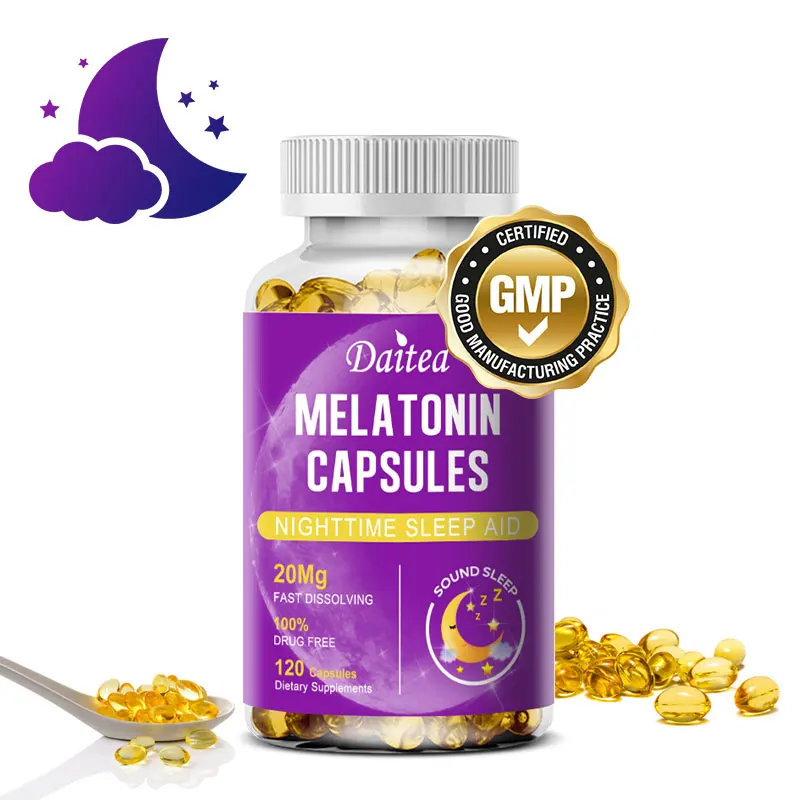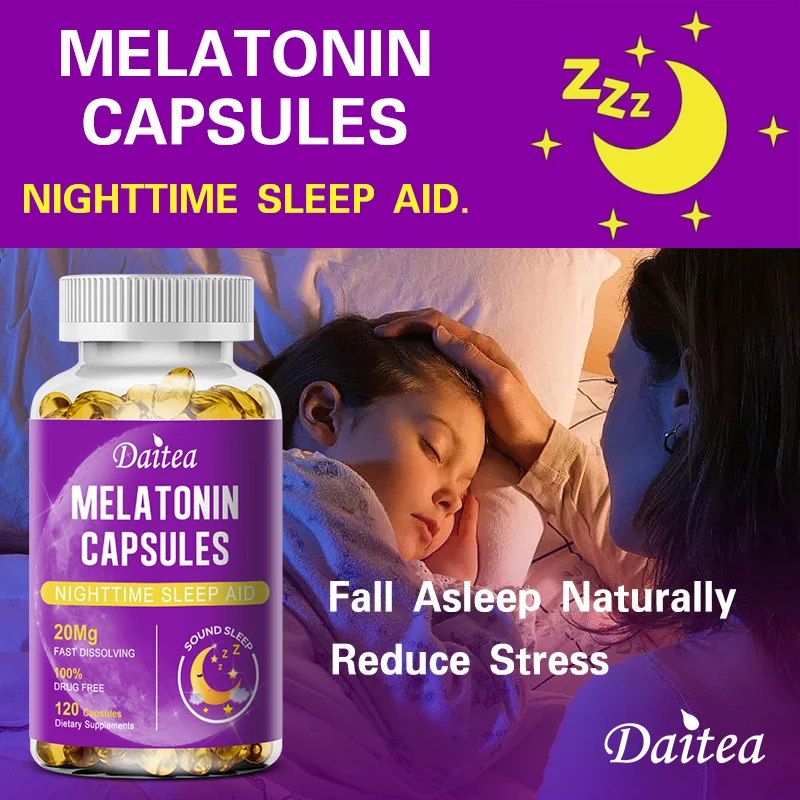Melatonin 20 mg Benefits:
Melatonin (exogenous pineal component) is a substance released by the pineal gland in the brain. Studies have shown that melatonin controls the body’s biological clock. As we age, our melatonin levels decrease year by year, leading to a series of symptoms such as insomnia, dreaminess, and forgetfulness.
Taking melatonin supplements can restore the body’s melatonin levels, regulate biological rhythms, and effectively improve sleep quality. Our melatonin dissolves quickly. Melatonin is currently recognized as a “stable” alternative with no side effects and does not rely on health foods.






Understanding Melatonin: The Sleep Hormone
Melatonin is a hormone primarily produced by the pineal gland in the brain, playing a crucial role in regulating the body’s sleep-wake cycles, commonly referred to as the circadian rhythm. This hormone’s production is closely tied to light exposure: it increases in response to darkness, thus signaling the body that it is time to prepare for sleep. Conversely, during daylight, levels of melatonin decrease, allowing the body to remain alert and awake. This natural rhythm is essential for overall well-being and affects not only sleep quality but also various physiological processes.
Biologically, melatonin serves as a potent antioxidant and has anti-inflammatory properties, which may further enhance its role in promoting relaxation. When melatonin levels are optimal, individuals often report improvements in sleep onset and quality. Notably, this hormone helps to reduce the time it takes to fall asleep, enabling a more restful night and a more refreshed morning. Disorders related to sleep, such as insomnia or delayed sleep phase syndrome, can be partially attributed to imbalances in melatonin production, thus making supplementation a viable option for many people seeking natural remedies.
Natural sources of melatonin include foods such as cherries, bananas, and oats, which can contribute to the overall melatonin levels in the body. However, for those who struggle to obtain sufficient amounts from their diet or face chronic sleep challenges, melatonin supplementation—especially in forms that cater to vegan diets—may offer an effective solution. By providing a direct source of this vital hormone, supplements can help restore healthy sleep patterns. In conclusion, understanding what melatonin is and how it functions will illuminate its significance not only for sleep but also for maintaining holistic health.
Benefits of Melatonin 20 mg for Sleep Quality
Melatonin, a hormone naturally produced by the pineal gland, plays a crucial role in regulating the sleep-wake cycle. The administration of melatonin, particularly at a dosage of 20 mg, has been recognized for its potential to enhance both sleep quality and duration. This higher dosage may be beneficial for individuals facing certain challenges related to sleep, including shift workers or those suffering from jet lag.
Research indicates that melatonin supplementation can significantly improve sleep onset latency, which is the time it takes to fall asleep. For those who struggle with initiating sleep due to various factors, a 20 mg dose may provide the necessary support. It helps recalibrate the circadian rhythm, which is essential for maintaining healthy sleep patterns. A number of studies have shown that this dosage can lead to longer sleep durations, indicating its effectiveness in promoting deeper, more restorative sleep.
Different populations, such as shift workers, who often experience irregular sleep patterns, may find a 20 mg dose of melatonin particularly effective. These individuals frequently face disruption in their natural body clock due to varying work hours. Melatonin’s ability to assist in adjusting the internal clock may result in improved sleep quality and overall well-being. Similarly, travelers grappling with jet lag can benefit from melatonin supplementation to minimize the adverse effects of rapid timezone changes. Clinical evidence supports that taking melatonin close to bedtime can alleviate symptoms and help individuals adapt to new time zones more efficiently.
Additionally, there is anecdotal evidence suggesting that users report increased relaxation and a decrease in the time taken to reach a deeper sleep stage. This combination of qualitative improvements demonstrates the potential advantages of melatonin 20 mg as a viable option for those seeking better sleep quality. As always, consulting a healthcare professional is recommended before starting any supplementation regimen, especially at higher doses.
Vegan, Gluten-Free, and Dairy-Free: A Health-Conscious Choice
As consumers become increasingly health-conscious and aware of dietary restrictions, the demand for supplements that cater to specific needs has grown significantly. Melatonin supplements are no exception; those seeking sleep aids are increasingly looking for options that align with their dietary preferences. The availability of vegan, gluten-free, and dairy-free melatonin supplements addresses the needs of individuals who refrain from animal products, have gluten sensitivities, or are lactose intolerant.
Vegan melatonin supplements are derived from plant sources rather than animal by-products. This is particularly beneficial for those adhering to a vegan lifestyle, as it ensures the integrity of their dietary choices is maintained. Furthermore, these supplements are typically formulated without any artificial colors, flavors, or preservatives, making them a pure option for individuals who prioritize natural ingredients.
Gluten-free formulas are also a crucial consideration for those with celiac disease or gluten intolerance. Not only do these individuals need to avoid gluten, but they must also be vigilant about potential cross-contamination found in non-gluten-free products. Quality melatonin supplements are often tested for gluten content, providing peace of mind for consumers who wish to remain gluten-free.
For people who are lactose intolerant or allergic to dairy, ensuring that supplements do not contain dairy derivatives is essential. Many melatonin products are free from lactose and dairy additives, making them a suitable choice for those with such restrictions. This attention to dietary needs allows consumers to choose a melatonin supplement that fits seamlessly into their lifestyle without fear of adverse reactions.
In conclusion, the availability of vegan, gluten-free, and dairy-free melatonin supplements provides essential options for individuals with specific dietary needs, ensuring they can benefit from the relaxation and sleep-promoting properties of this supplement.
How to Incorporate Melatonin into Your Nighttime Routine
Incorporating melatonin into your nightly routine can be an effective way to improve sleep quality and promote relaxation. To begin this process, it’s essential to determine the appropriate dosage. Starting with a low dose, such as 1 to 3 mg, and gradually increasing to 20 mg if needed, can minimize the risk of side effects while allowing you to assess how your body responds to the supplement.
Timing is critical when using melatonin. It is recommended to take melatonin approximately 30 minutes to one hour before bedtime, as this allows the supplement to sync with your body’s natural circadian rhythm. Since melatonin production is influenced by light exposure, dimming the lights in your home as bedtime approaches can help signal to your body that it is time to wind down. Additionally, using blackout curtains or wearing a sleep mask can create a conducive sleep environment by minimizing light interference.
Beyond the direct use of melatonin, certain lifestyle practices can enhance its efficacy. Establishing a consistent sleep schedule, where you go to bed and wake up at the same time each day, trains your body to follow a rhythm conducive to sleep. Limiting screen time an hour before bed can further benefit sleep quality; the blue light emitted by devices can inhibit melatonin production and disrupt your body’s natural sleep cycle.
Moreover, practicing relaxation techniques, such as deep breathing or meditation, before sleep can complement melatonin supplementation by alleviating stress and tension. Creating a bedtime ritual that signals to your body that it is time to rest can reinforce healthy sleep habits. However, it is important to consult with a healthcare professional before starting melatonin, especially for individuals taking other medications or those who have underlying health conditions.
Potential Side Effects and Considerations
While melatonin is generally considered safe for short-term use, it is important to be aware of potential side effects and contraindications that may affect certain individuals. Common side effects reported with melatonin supplementation include dizziness, daytime drowsiness, and headaches. Occasionally, users may experience vivid dreams or changes in their sleep cycle, which could lead to interpretations of altered sleep patterns. Though these effects are often mild, they signify the need for caution, especially among individual users sensitive to hormonal changes.
Certain populations may need to avoid melatonin supplements altogether. Pregnant or breastfeeding women are advised against using melatonin due to a lack of sufficient research regarding its safety in these groups. Additionally, individuals with autoimmune diseases, epilepsy, or those suffering from mood disorders should consult a healthcare professional prior to incorporating melatonin into their routines. These conditions may interact adversely with melatonin’s effects, potentially exacerbating existing health issues.
Another consideration involves drug interactions. Melatonin can have potential interactions with various medications, such as anticoagulants, immunosuppressants, and sedatives. For instance, individuals taking blood thinners may experience altered effects due to melatonin’s influence on clotting mechanisms, while those on sedatives might feel increased drowsiness. It is crucial to inform a healthcare provider of all medications being taken to ensure safety and efficacy when considering melatonin.
Before starting any new supplement regimen, including vegan melatonin, it is wise to consult with a healthcare professional. This precaution helps to establish the appropriate dosage and duration for effective use while minimizing risks and side effects. Being informed allows for a more knowledgeable approach to achieving relaxation and improved sleep through supplementation.













Reviews
There are no reviews yet.